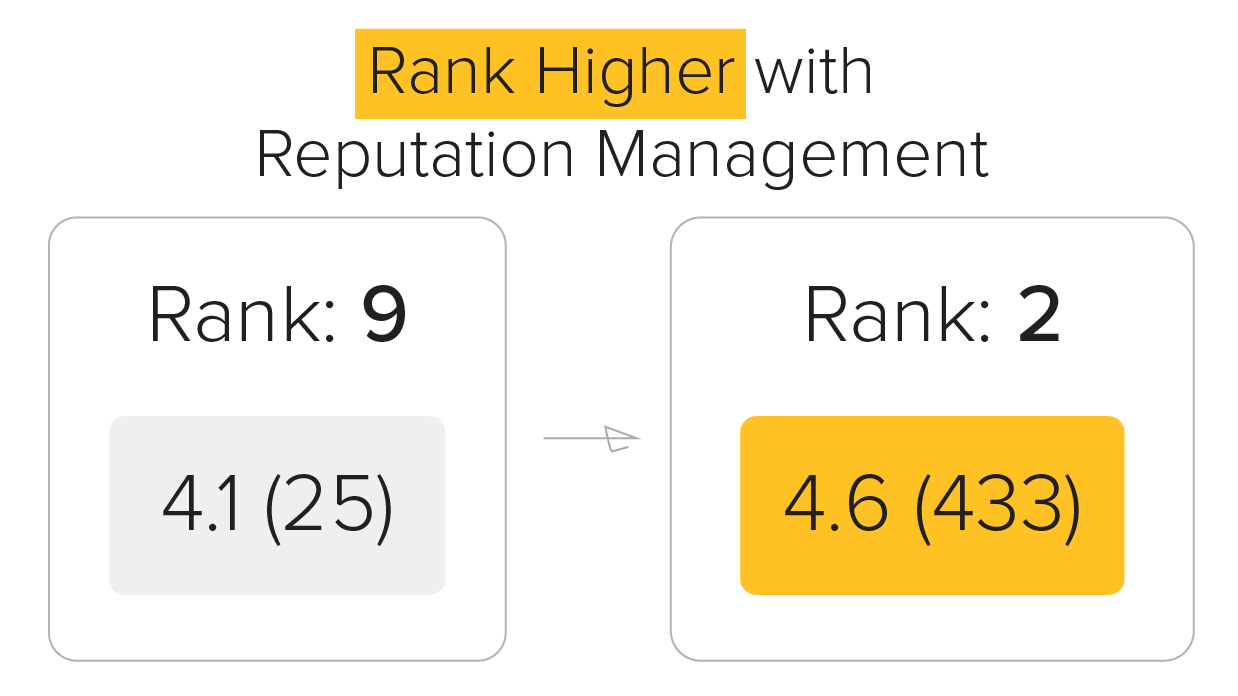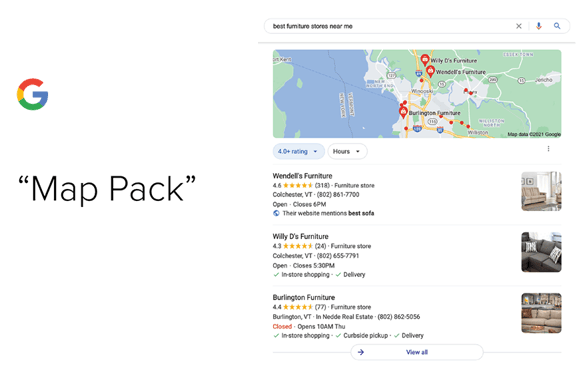Ever wondered how to get your business on the first page of Google search results? It starts with an effective online reputation and review management strategy. Learn how a few small tasks can make a big difference for your local ranking.

A reputation management strategy is all about helping your local business show up here.

This is called the "map pack", and showing up here will drive new customers to your business.
When your target audience is close to home, optimizing for local SEO increases the likelihood of local shoppers discovering your brand, exploring your services, and converting into a customer.
Among other things, online reputation management services can help you bolster a vital part of your company's reputation; online reviews. Not only do search engines use review content and engagement to assess a local business and determine its ranking, but reviews also work to establish trust between you and the consumer and ensure prospective customers that you're committed to customer satisfaction.
Best of all, optimizing your reputation and review content strategies can begin to show results, including increased Google star ratings, in 30-60 days.
Let's get into it.
Whether you're looking for restaurant options or calling on an HVAC repair company, odds are you've scoured some reviews before making any final decisions. And you're not alone. 93% of consumers say online reviews have an impact on their buying decision.
Having an abundance of positive reviews for prospective customers to learn from ought to be a crucial component of your reputation management strategy.
If you're thinking, "Shouldn't I focus on improving my search ranking before worrying about online reviews?", online reviews and search ranking are actually largely intertwined. A lot of positive reviews not only helps build consumer trust but also increases visibility for your brand on search engines. So the more reviews you're able to bring in, the more Google and other search engines will prioritize your business on search results.
When you boil it down, Google is chiefly looking at four online review factors in order to determine how they should rank your business:
Let's look at these factors more in-depth and explain how a quality reputation management company can provide specialized attention to each one.
Volume simply pertains to the number of online reviews your business has accumulated. Google has found that looking at online reviews is a great way to use the opinions of real people to determine a company's search ranking.
The more reviews your company is able to bring in, the better off your local ranking will be. An online reputation management company can help you develop review management strategies that ensure you're bringing in new reviews on a regular basis.
Your new reviews will speak volumes about the quality of your business to prospective customers and, as you gather more and more reviews search engines will prioritize your business in their local rankings.
BrightLocal's Local Consumer Review Survey found that review frequency, along with quantity, quality, and response, accounts for 13 percent of Google’s local three-pack ranking factors, and about 7 percent of Google’s local organic ranking factors. This means that, if a business hasn't been reviewed in a while, chances are its local ranking will start to slip.
It takes time and effort to coordinate customer outreach and bring in reviews on a frequent basis, and you're likely busy enough as is. A reputation management company can provide continued support when it comes to ensuring new reviews are frequently coming in the door.
Acquiring reviews may seem like a tedious task, but working with the right partner can help your business include easy-to-navigate CTAs that ask for feedback on all relevant web pages, emails, and SMS messages. Asking for feedback often and making it easy for customers to share their thoughts on your business greatly improves the frequency of new reviews.
Customers use reviews to separate the good businesses from the bad ones. Search engines operate in a very similar fashion.
Google wants to provide its users with the best possible solution for their search queries. When a business is consistently receiving 4 or 5-star reviews with glowing customer feedback, Google feels confident in showing that business to prospective customers.
While a reputation management company can't ensure negative reviews will never trickle in, what they can do is work to gather more feedback from more customers.
More than likely, your satisfied customers outweigh the displeased. Otherwise, you'd be out of business, right? A pure numbers game, bringing in more review content will bring in more positive review content, diluting the negative feedback. you have to activate the voice of your happy customers, as they are inherently less motivated to leave feedback.
As Google begins to digest the volume, frequency, and quality of your reviews and sees that you're performing well across all three metrics, your local ranking will start to improve.
Get this; according to BrightLocal, 20% of consumers expect to receive a response within one day after leaving a review. Additionally, Google states that businesses should “interact with customers by responding to reviews that they leave about your business. Responding to reviews shows that you value your customers and the feedback that they leave about your business.”
If Google is telling you it's good practice to respond to reviews, then you'd be wise to heed their advice. This is all to say that managing reviews doesn't stop once a customer has left their feedback. It's on you to respond thoughtfully and professionally to every review left by a customer, and either thank them for their kind remarks or address their particular concerns.
A reputation management company can provide a human-powered approach to review response management. Your review management company will avoid cookie-cutter, templated responses that tend to reflect poorly on your business, and will instead take the time to provide personalized responses to every review.
Your reputation management company can also help you compile a list of target keywords to use in your review responses. Google will scour reviews and review responses for keywords people often search for. If your business keeps these keywords in mind when responding to reviews, it could help you rank higher.
When it comes to the volume, frequency, and quality of your reviews, a reputation management company can implement effective strategies to ensure you have a well-oiled review management engine in place.
In the meantime, there are steps you can take on your own to start the process of improving your local ranking. We've provided just a few of these simple steps below.
Take The Quiz
How competitive is your reputation management strategy?
We’ve put together an easy way for you to find out.
Discover how your reputation management efforts stack up against industry benchmarks. Then find out how to improve them for free.
The quiz is 4 questions. Done in 30 seconds.
When you finish, we will tell you what it takes to score a 100.
Want your business listed in the prime real estate available in Google's local results? Step one is to set up your GMB account.
In Moz’s State of Local SEO Industry Report 2020, respondents cited GMB elements (keywords in name, industry category, business information, etc.) as the most important factor in generating local-specific search results.
Additionally, 75% of marketers believe that the use of GMB profile features impacts rankings in the local pack.
This is an easy win, so sign up if you don't already have one (it's free).
Google appreciates when a company puts out informative and insightful content in its given niche. When it comes to building local links (a critical factor in determining your company’s local ranking), Moz’s State of Local SEO Industry Report 2020 found that 38.1% of respondents believe content development yields the best ROI.
Whether it’s through blogs, case studies, webinars, or infographics, find ways to generate content that you know your local audience will appreciate and find valuable.
For example, if you own an HVAC company in Florida, publish a blog describing five ways to save money on HVAC costs during the Florida winter.
The more focused and localized you can be with your content, the better your local ranking will be.
What words do prospects search with when looking for your services?
You could go door-to-door asking folks what comes to mind when they think of your service offerings, but obviously, that's a waste of time.
Instead, take advantage of keyword research tools in order to get a sense of which business-related search terms are most popular. Platforms such as WordStream, Google, SEMrush, and SpyFu all offer great information when it comes to understanding which keywords you ought to be targeting.
Compiling a list of locally popular keywords that pertain to your business is a great place to start when developing a content development and marketing strategy.
But fair warning: Google will penalize businesses that cram too many keywords into a single piece of content. The best content strikes the perfect balance between local keyword phrases and legitimately insightful information.
While there are many steps you can take on your own to boosting your local ranking, the best local SEO strategies require daily maintenance and constant monitoring.
Having a business to run, you probably have limited time to focus on your local ranking strategy. That’s where a qualified reputation management company can be your best friend.
Reputation management companies, like Widewail, understand that optimizing local SEO strategies is a never-ending process that requires consistent analysis and active engagement. By outsourcing time-consuming local reputation management solutions — from amplifying customer feedback outreach to responding quickly to online reviews — you’ll have more time to focus on internal business objectives.
If you’re ready to take your local ranking strategies to the next level, consider calling on an experienced local reputation management company that specializes in empowering businesses to attract visitors, generate leads, and deliver conversions.
Check out Widewail Academy's free GMB courses (101 and 201) to take your local marketing skills to the next level and make sure your business is leading the pack in SEO.
I’m the Director of Marketing here at Widewail, as well as a husband and new dad outside the office. I'm in Vermont by way of Boston, where I grew the CarGurus YouTube channel from 0 to 100k subscribers. I love the outdoors and hate to be hot, so I’m doing just fine in the arctic Vermont we call home. Fun fact: I met my wife on the shuttle bus at Baltimore airport. Thanks for reading Widewail’s content!
Bite-sized, to-the-point, trend-driven local marketing stories and tactics.
U3GM Blog Post Comments